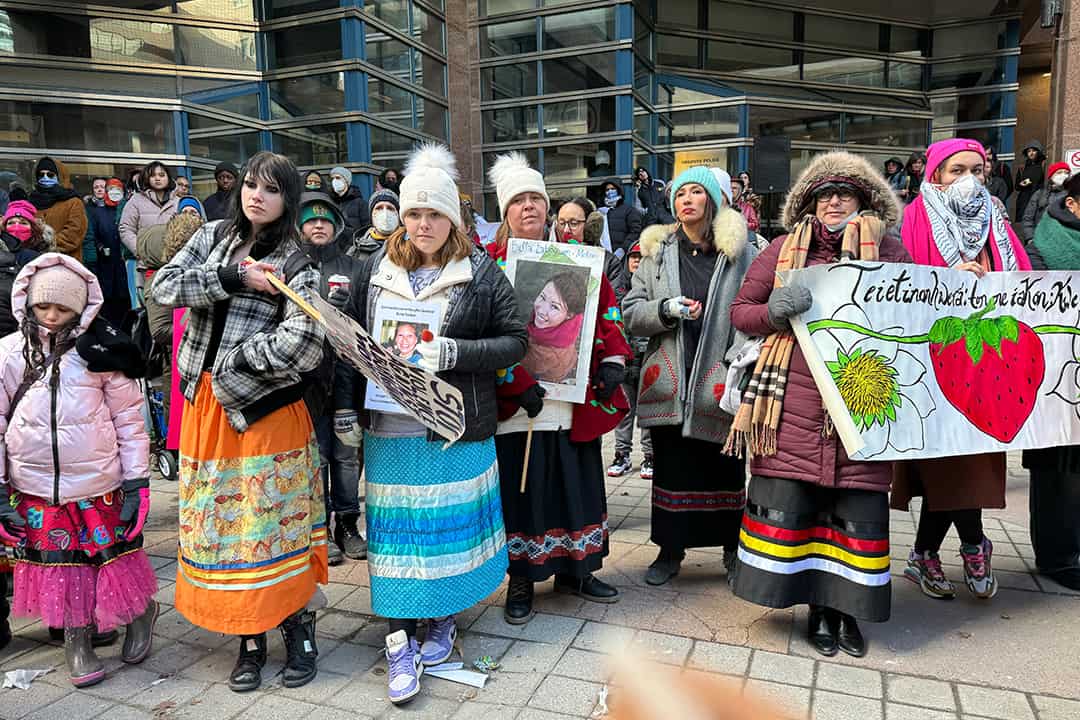Content warning: This article discusses anti-Indigenous racism; violence against Indigenous women, girls, trans, and Two-Spirit people; and death.
“We should not judge anyone for where they live, or what they do, or what they have in their pocket, or what they have in their body. It’s not up to us to decide someone else’s life journey. But we can’t leave them alone. We need to spread the love as soon as possible,” said Mi’kmaw Elder Wanda Whitebird, addressing the crowd gathered for the 19th annual Strawberry Ceremony in Toronto.
No More Silence — an organization founded in 2004 which aims to commemorate missing and murdered Indigenous women, girls, trans, and Two-Spirit people, and to engage in community-led activism against gender-based violence — organized the February 14 event.
Attendees from U of T’s First Nations House — which led a walk from its location at 536 Spadina Avenue to the event in front of Toronto Police Headquarters — were among the 155 Indigenous people and allies who honoured Indigenous women, girls, trans, and Two-Spirit people at the ceremony and drew attention to their overrepresentation in Canada as victims of violence.
Violence against Indigenous women, girls, and 2SLGBTQQIA people
Statistics Canada’s 2018 Survey of Safety in Public and Private Places found that more than six in 10 Indigenous women reported having experienced physical or sexual assault; in particular, Indigenous women with a disability and those who have lived with homelessness experienced assault at higher rates.
The National Inquiry into Missing and Murdered Indigenous Women and Girls, launched by the Canadian government in 2016, released a report in 2019. The report implicates “colonial violence, racism and oppression” in causing the disproportionate violence against Indigenous women, girls, and 2SLGBTQQIA people and argues that the violence directed against them constitutes genocide.
The report discussed how patriarchal structures imposed by settlers, forced sterilization, destruction of culture through the residential school system, and economic marginalization all contribute to these patterns of disproportionate violence.
Along with facilitating spaces for grief, No More Silence collects the stories of murdered women; advocates for building crisis response alternatives to the police; supports Two-Spirit, trans, and gender non-conforming people; and pushes for a harm reduction approach to issues such as homelessness, drug use, and trade sex.
Since last year’s ceremony, No More Silence added the names of three more Indigenous women who were murdered or died after they went missing to its community-run database: Jenna Ostberg, Jocelyn Greene, and Mackenzie Moonias.
The Strawberry Ceremony
The Toronto Council Fire’s Indigenous Residential School Survivors group opened the ceremony with the Cherokee Morning Song.
One of the speakers at the event read a speech on Joyce Carpenter’s behalf. Carpenter told the story of her daughter, who passed away in 1992. She wrote that when the police found her daughter’s body, they classified her death as ‘accidental.’ Carpenter believes they made racist assumptions about her daughter and the circumstances of her death.
“It seems the cops have tunnel vision when it comes to [the] deaths of our girls,” wrote Carpenter. “They absolutely need training to be more considerate and compassionate when it comes to working with families who have lost loved ones.”
Carpenter mentioned that in many cases, police fail to investigate the deaths of Indigenous women, girls, trans, and Two-Spirit people.
At the ceremony, volunteers distributed a strawberry and a cup of water to each participant. Water, Whitebird said, is “the most powerful entity” since it comes from nature and nourishes all forms of life on Earth. A strawberry — which, Whitebird explained at last year’s ceremony, is considered a woman’s medicine in many Indigenous cultures — is called ode’min in Ojibwe, which comes from the word ‘ode,’ meaning heart. The strawberry also represents a young girl’s transformation into a woman.
Another key event moment was a performance by a group of young girls from Wandering Spirit School, led by Anishinaabe Indigenous language advocate and grandmother Marie Gaudet.
“Nineteen years we’ve been coming here,” Audrey Huntley, co-founder of No More Silence, told the crowd. “We won’t stop coming until the violence stops.”



No comments to display.